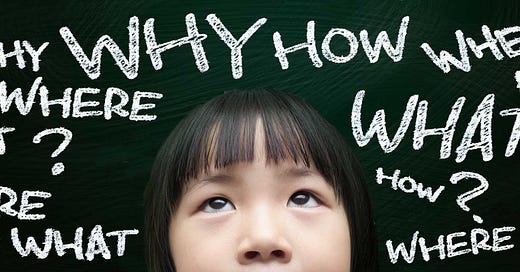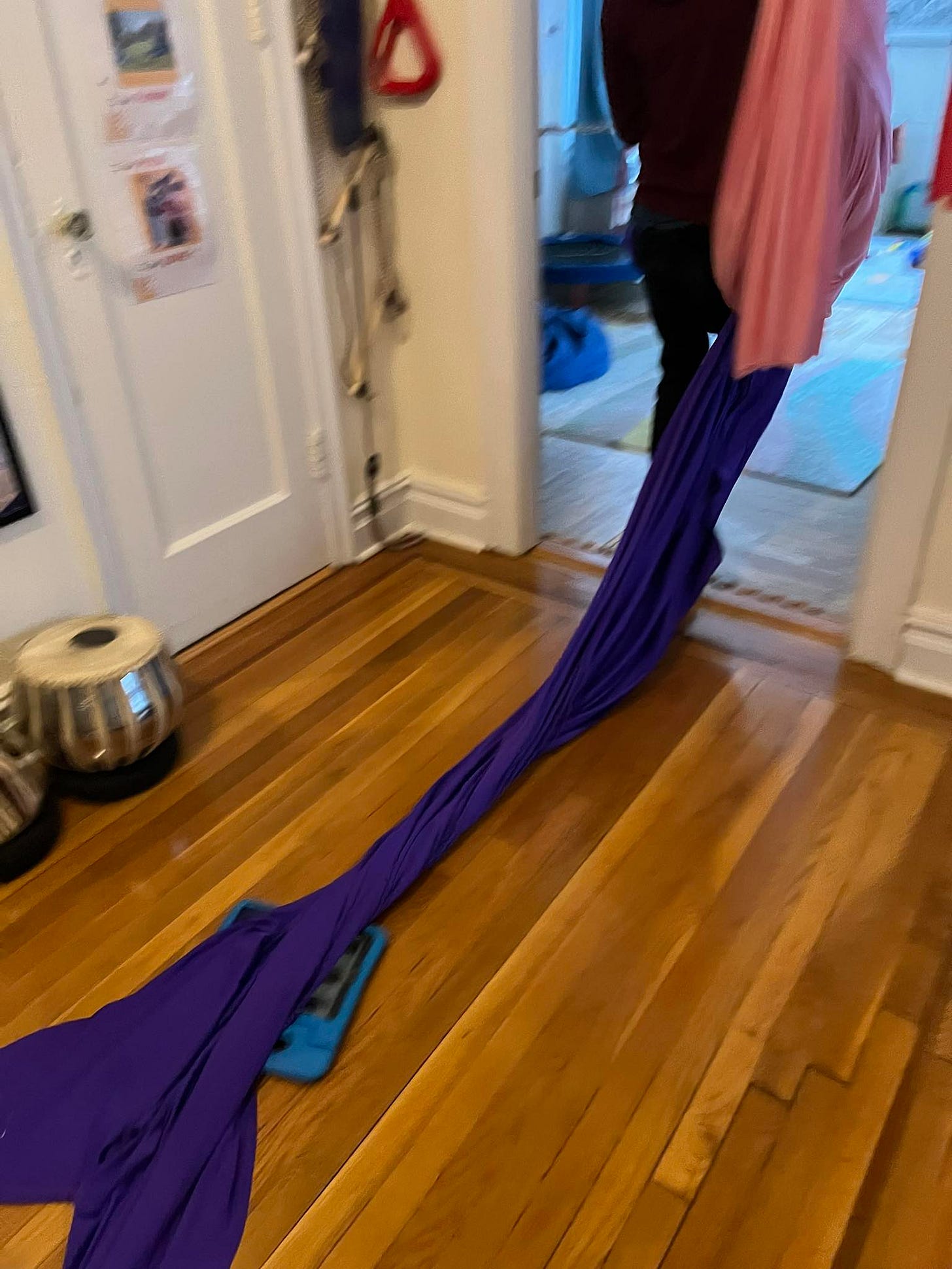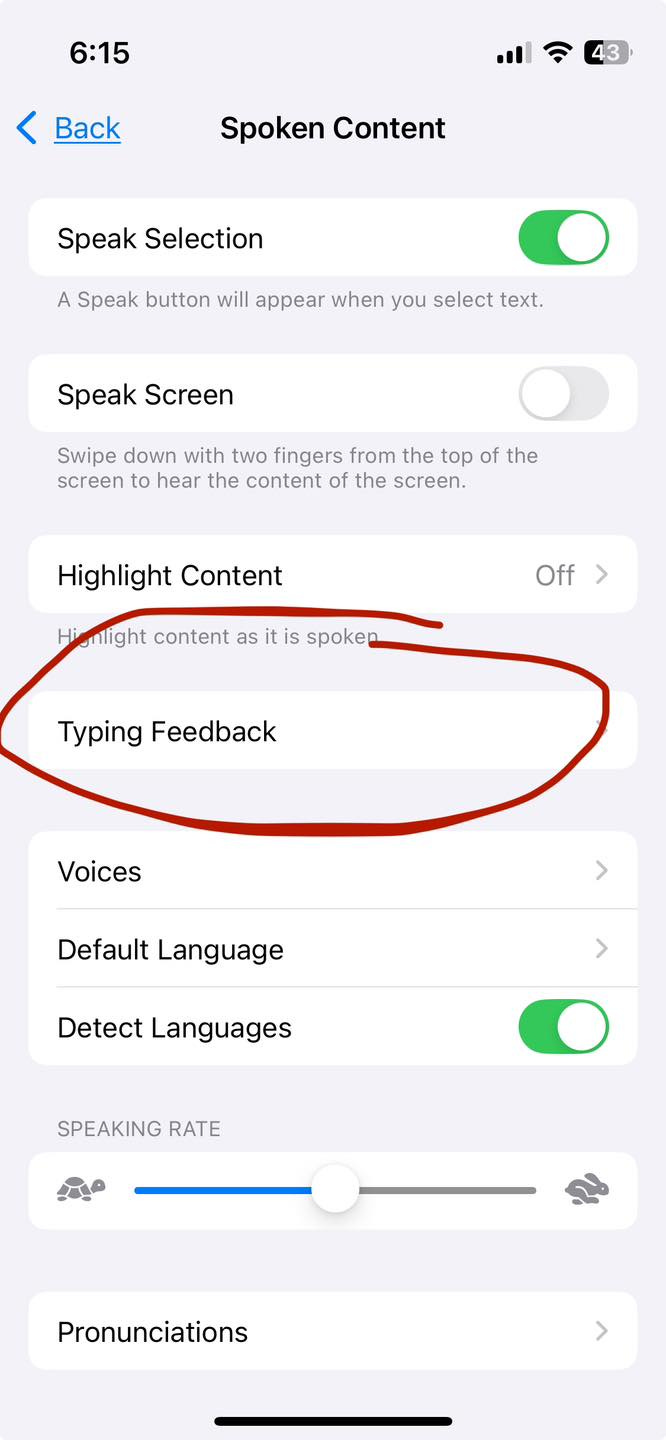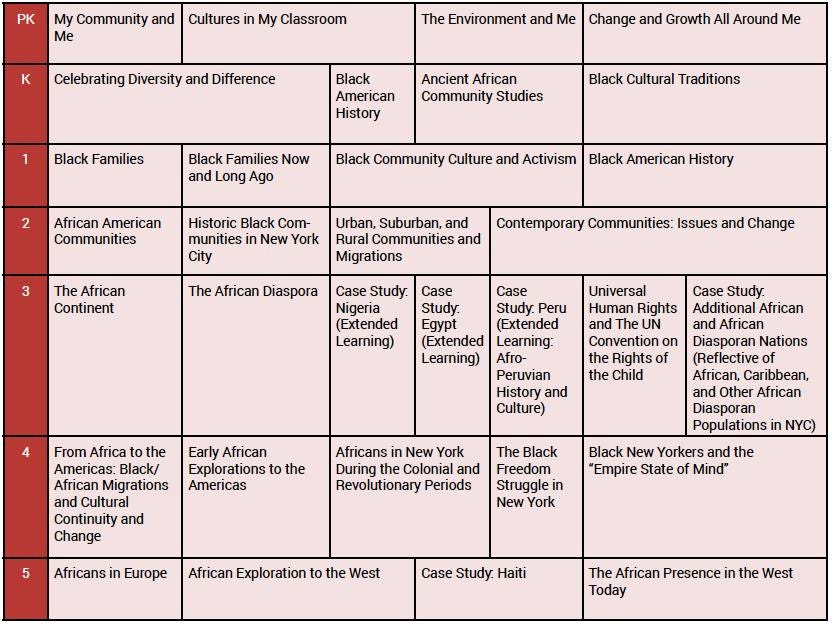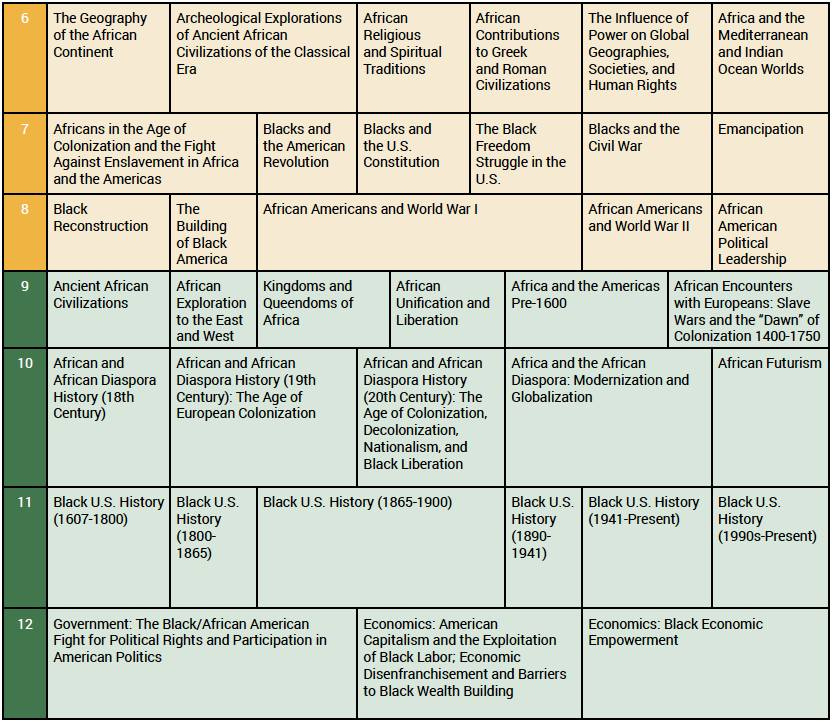We MUST proactively talk about this moment with our non-speaking kids .. but how?
And ABA everywhere; video commentary; choreography level up!; telling time; keyboard feedback; long pauses; amazing Black studies curriculum
In this issue…
ABA questions even in evaluations (Mar 29)
A lot of people write about how their kids are subject to ABA-like-things even if they aren’t in ABA (like in school).
It reminded me that when we did A-s “turning 3 evals” - which is an age in nyc where you switch into a new system - we had this evaluation by a social worker as part of the process. It was her asking me questions by phone to decide what services and classroom setting A- should get.
One question she asked is what does he like that he’s motivated by. This was for an eval - not for services and the DOE doesnt provide aba as a service anyway. Still she wanted to include it in his report so they had on record, I guess, what rewards to use for him.
Other fun fact is when I pushed back, she told me she used to be a music therapist who thought ABA was bad but then when she got trained in ABA she realized how great it is. Ask me why I don’t think all music therapists are automatically amazing
How to add commentary to YouTube videos (Mar 29)
For anyone else looking to add audio commentary to YouTube videos for the person they support, Zoom was a total fail. But I found Veed (we already use this app for subtitling), which definitely works. I think I have to upgrade to the paid version though to get rid of water marks, have high res downloads, and add on subtitles. But depending on the kid, the free one may work.
Also I'm sure there are many other apps similar to Veed! It was really easy to use - although I need to figure out why I was so quiet and play around with how close I am to the mic and stuff.
I've made 2 "Amma commentary" videos for A- on his bus videos so far and they're a hit!! And by hit I mean that A- has watched the videos for at least 20 seconds before switching to something else!
So far I've just talked about the buses I see, what they're doing, what color they are. I've done some commentary on a guy on the sidewalk who was seemingly videotaping the buses, and the construction noise! Hopefully soon I'll start incorporating everything from shapes and counting, to observing people in the community, and doing some out loud wondering of what's happening in a given scenario. We'll see how long this lasts!
Our Take me to Church choir! (Mar 29)
Last week I wrote about this choir Daniel and I were going to to sing Hozier's "Take me to church" which - being about Russia's churches treatment of the LGBTQ community - has always been such a meaningful song for me, but has taken on a new meaning for me in the past couple of months about institutions condemning people's humanity. Also about how there's an Allison Russell version that's amazing as well (Allison Russell being the inspiration for the name of this blog).
It was so powerful. So powerful because of the song. Because of the people who choose to came to sing this song. As I predicted I cried every run through. Of course, the video can't do it justice like being in a room full of hundreds of people with deep personal attachments to this song. The first time we sang it through we were all loving on the strangers around us. I said "I've needed this for years." The woman in front of me, who was also singing it with her full body, said "me too."
(If you do watch part of this, scroll forward. It builds).
Choreography to the next level! (Mar 30)
A- has started making us run around the apartment dragging this very long Lycra I haven’t bothered cutting in half yet. He watches it as he choreographs us to run around and it makes patterns like a ribbon.
I feel like this is the next stage of his choreography. Before it was just people, and now he’s incorporating props into his visual movement art. He’s also gotten more advanced with having 2 of us do very different things at the same time.
It’s funny because I added to his IEP goals for next year that he would advance his choreography skills to the next level, but I guess he’s doing it already.
“He will expand on his love of choreography in ways that are meaningful to him such as becoming more nuanced in his direction, or incorporating video and photography to add multiple dimensions to his art.”
How a love of buses leads to telling time (Mar 31)
Our new babysitter asked us yesterday if A- can tell time. She told him that we would be home by 4:30 and at 4:30 on the dot he looked up at the door. She wondered if he was reading the time on his iPad during computer time.
This isn’t the first example of this. Our other babysitter would sometimes say he was happy all afternoon until 2 minutes before we got home.
Unschooling at its finest? Daniel says he must know how to read time because he knows how to read bus names. Our buses are mostly 1 and 2 digit numbers, coupled with our counting and stuff, it’s not a far stretch for him to know “4” and “30”.
We haven’t even done much explicit work on telling time except saying what time it is a lot, and a Pictello Daniel made to the tune of rock around the clock that says each time of day and what we do at that time. A- used to like watching that so it probably helped with the concept of time.
Small change, big impact. Typing feedback. (Mar 31)
I think turning on “typing feedback” has been the most impactful small change we’ve done lately to support A-s communication.
One key thing A- wants to communicate to us is what bus he wants us to search for in YouTube. He uses his mouth, but in a way we often don’t understand (except Daniel), which leads to him being mad when we’ve searched for the wrong thing.
One challenge is that he’d ask for something but then not look at the screen when we type - usually he’s jumping around - so it was hard to use this as an opportunity to model the keyboard so he could search himself. AND it meant by the time we got it wrong, we didn’t know what part of what we typed was wrong. (NYC buses have one of 5 prefixes and 2 or 3 digit numbers afterwards), so it could have been the prefix or the numbers.
We tried making a proloquo2go page, and still have more things we’ll try, but the best thing we did is turned on the keyboard speaking thing. It says every character out loud as you type it.
Now he pays attention when we type each key, so hopefully he’s learning AND he knows immediately if you are getting it wrong and will keep repeating what he’s saying. (If you’re getting it right he won’t say anything). Armed with a list of about 15 buses he could be asking for, and having an approximate idea of the first letter, once you know you’re getting it wrong you can move onto the next option. With this new strategy we have even been able to tell his babysitters so they can now easily help A- get to the videos A- wants!
All we needed was a bit of auditory feedback.
We MUST proactively talk about this moment with our non-speaking kids (Apr 1)
And realizing the massive privilege of having access to symbolic communication.
I'm trying to build a way to talk to A- about what is happening in the US. I have tried to figure this out the way I approached figuring out how to tell him about my dad dying. I asked in the Easy Read Facebook groups, googled plain language versions, and then went to regular parenting FB groups to ask other parents what questions their kids had when they told them about what's happening. This "what questions do your kids have?" is critical because in wanting to tell A- about my dad dying, I also wanted to try to preemptively quell his anxieties, since he couldn't ask me any follow-up questions.
But this is infinitely harder than figuring out how to tell A- about my dad dying. There is no material out there yet (in the US). And what parents are telling their kids differs wildly. Which makes sense. Death is as common as living. While the specifics vary, the outcome is the same.
Authoritarianism, not as common. While one parent thinks that what is happening is a "President who doesn't like women", another thinks the oligarchy is systematically destroying our nation and world for their financial gain, and unless you're a billionaire you are going to be used for capital. While some parents think that a few people are getting deported and some disabled people may be impacted, others think we're about to have some sort of martial law declared and borders shut down. And, of course, while some families know intellectually that things are happening out there to some people, but nobody they know, some kids parents have been disappeared or have to flee to stay safe.
"Where does someone go when they die?" is a refrain as common as "where do babies come from?", but "Is mom or dad going to be disappeared?" is less common.
Here's where I realized the immense privilege other kids have. The parents, in my FB poll, who are talking to their kids about this moment, are saying broad brush strokes about a mean man who's President and then focusing on things like mutual aid, community support, and all the ways we can connect and be nice with each other. This seems like a great approach! It's very age appropriate! And it assumes that your kid can ask lots of questions. It assumes that your kid when they overhear someone talking about deportations, or people losing jobs, or losing healthcare, or the price of groceries skyrocketing, can ask you questions. Tell you they heard that. Ask you what it means.
Imagine the experience of overhearing a snippet of what is going on in the country - people in your building don't want to go outside for fear of being detained, that everyone in the government is fired, your babysitter is fleeing the country, ICE is harassing someone a block over from where you live - and you have no ability to ask your trusted adult about that. Leaving you to spin out your own stories about what's happening and how it will affect you and your family.
And while many parents know to preemptively talk to their kids about big topics - have the sex talk so they're getting accurate info and not schoolyard gossip. Talk about dying so that they feel comfortable with the accurate truth through you (even if each of our family's specific beliefs differ!). I've learned that non-speaking kids (and adults), or those with intellectual disabilities, are routinely not told anything. That even the amount of talking about my dad dying was more than many people get.
Which means that it's even more important we talk to our non-speaking kids about this political moment. But how? How to be accurate, and preemptively quell anxiety, without creating anxiety if it wasn’t already there?
I have a friend who was a refugee from an authoritarian country when she was 5 and I asked her what she would have wished for communication-wise. And she told me she wished people hadn't lied to her. That she *understood* things were going on. She wished people had been telling her the truth so that when they fled, it was already something she understood. If A- takes longer to process things, all the more reason not to wait until the last minute to say something.
I have zero answers for how to do this though. "How to be accurate, and preemptively quell anxiety, without *creating* anxiety?" Our times are unprecedented in this country.
Perhaps, if some of you have connections with people who have gone through this in other countries (or similar-ish situations), we start by asking them. Maybe we can find books in those countries geared to kids, just the way I found books about dying for kids. If there are others in this same position as in our family, we could start an email group to share thoughts?
Maybe we are doing things right (Apr 2)
A lot of times over the past few years I've wondered if when we zoom ahead into the future, A- will have "similarly developed" to his peers who've had more extensive therapies, school, socialization, etc. As in.... did we make the right choices? What if we didn't? And if we did, can I say "hey parents - you don't have to listen to the experts either! Look at A-!"
Right now seems to be that future - here way faster than I thought.
Monday was a school holiday, so I got to accompany Daniel and A- on their Monday adventure. A- seemed very excited to show me all his spots. One spot was a particular playground which on Mondays is typically pretty empty, of course, but being a school holiday it was PACKED!
A- loves to own the spiral slide. Go up and down. Direct me and Daniel up and down it. Usually he experiences empty spiral slides. He's good at letting other kids use it when there are other kids around. He's good at knowing Amma and dad can't use the spiral slide when other kids want it. But on this day it was like... empty for a minute and then approximately 100 kids would line up for it. We tried taking turns but it was untenable.
I crouched by A- at the bottom of the slide as he looked at the line of kids coming down, as I sometimes do. I quietly told him about school and how he's unschooled and these other kids go to school most days. I told him that he can use the slide whenever he wants, but that these kids sit at desks in a building all day and they can only slide sometimes. I told him that we should consider just letting them use the slide because he can come back every day and use the slide for as long as he wants, but they can only use the slide when they aren't in school.
As he often does these days when I'm telling him sometime, he just kept staring straight at the slide. Seemingly "not paying attention", but also not moving. Just staring intently. After I said stuff a few different ways, I left and he kept staring for another minute. And then he left the slide and came to play with something else.
In the words of another parent - for any 5 year old to have that empathy and leave their slide is a pretty big deal! A- is a pretty big deal.
Uncomfortably long pauses (Apr 2)
I want to share this really obvious thing. You know how they say for some autistic people you have to wait a really long time to give them processing time? It's usually said in the context of communication - wait 15 seconds for them to respond.
For A- I've noticed this is true (as of late) when we ask him to do something. Sometimes, I can say "You have to put on pants" and then I have to sit in silence for an uncomfortably long time - a few beats longer than what I think is the right amount of time - and he'll stick out his leg.
This is such common advice, but we haven't really done it (it hasn't really been true for A- until recently). And even now, we are VERY BAD at doing it. So maybe we aren't the only caregivers out there who need a reminder! This is your reminder!
There are some helpful comments on the FB version of this post!
What I’m reading and listening to…
This PK - 12 Black Studies curriculum is AMAZING!!!! It was created for the NYC DOE by dozens of amazing historians, writers, artists, but is applicable to anyone in the US and is available for free! It includes a curated booklist by grade, and other websites to learn more.
In my search for how to talk to A- about authoritarianism, someone shared this book.
In general, social media memes aren’t very helpful for me with parenting A-. But this one on literacy tips for kid with apraxia was helpful for me!
I read Another Word for Love by Carvell Wallace a while ago, but have been thinking about it lately. It’s an incredibly beautiful, thoughtful, relatable, funny, emotional memoir. It’s especially a book for the men in your lives who have spent their lives trying to dismantle the patriarchy from their psyches and sometimes feel completely alone doing it. It’s a book, I believe, that makes you feel less alone.

